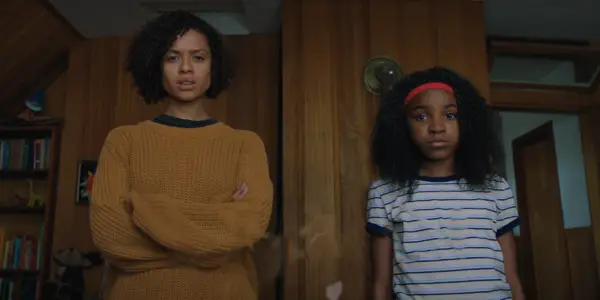FAST COLOR: Gugu Mbatha-Raw Will Save Us All

Lee Jutton has directed short films starring a killer toaster,…
It seems as though everywhere you turn these days is a reminder that Avengers: Endgame, the conclusion to the Marvel Cinematic Universe story arc that began eleven years ago with Iron Man, is hitting theaters. Yet there’s another movie about humans with supernatural abilities currently in theaters that deserves just as much of your attention, if not more so – after all, unlike Avengers: Endgame, this movie doesn’t have the luxury of screening a dozen times a day in cinemas all over the world. It’s a small yet sparkling jewel of a film that you have to seek out, but if you do, you’ll be rewarded with a beautiful experience.
I’m talking about Fast Color, the sophomore feature from director Julia Hart (Miss Stevens). Co-written by Hart and producer Jordan Horowitz (La La Land), the film tells the story of three generations of women who have supernatural gifts. Naturally, there are shadowy figures out there seeking to find these women and take advantage of their special abilities. A kindred spirit to the underappreciated Midnight Special, Fast Color lacks the bombast of a stereotypical superhero movie but more than makes up for it with a beautiful multigenerational saga about the power naturally inherent in women – especially when they “stick it together.”
On the Run
In a near-future world where the Earth is dying, crops are dwindling, and it hasn’t rained for months, Ruth (the magnetic Gugu Mbatha-Raw) is on the run. She sneaks from one shifty motel to another under the cover of night, spending the little money she has on overpriced jugs of water and begging to swap basic services for food where she can. Ruth has a good reason for remaining in the shadows: she is plagued by uncontrollable seizures powerful enough to cause earthquakes.

Fleeing the shambolic scene of one of her seizures, Ruth comes across a supposed good samaritan who offers her a ride. However, he quickly reveals himself to be a government agent who will stop at nothing to bring Ruth in and subject her to all kinds of involuntary tests for the sake of finding a way to harness her abilities to fix the current state of the world.
Ruth finally seeks shelter with her estranged mother, Bo (Lorraine Toussaint), and her young daughter, Lila (Saniyya Sidney). Bo and Lila live in a house on the outskirts of town where women of their family have lived for generations, hiding the strange abilities they have from the world outside. Both Bo and Lila can take objects apart with their minds and put them back together again in a swirl of color. Ruth could do this too, once upon a time; then her seizures happened, her abilities disappeared and her life spiraled out of control.
With her mother and daughter’s guidance, Ruth attempts to harness her abilities once more. But past and present traumas threaten to derail Ruth’s hopes for a safe future with the ones she loves.
Who Run the World
Fast Color centers on three generations of superpowered women of color, so it’s only fitting that those women are what give the film its own superpowers. Each of them has made sacrifices as a result of the gifts they’ve been given, and each of them has dealt with the aftermath of those sacrifices in different ways. Together, they are a prime example of the strength that, even if hidden down deep inside, will always surface in women when those who seek to harm their loved ones come knocking. Because of this, Fast Color feels altogether grounded in reality even as Ruth, Lila, and Bo do things with their minds that are beyond our wildest dreams.

As Ruth, Mbatha-Raw is the raw emotional center of the film, a woman struggling to deal with her own residual trauma as well as the pain she has caused others. Small but specific details, such as Ruth’s affinity for the punk band X-Ray Spex, reveal far more about her than a lengthy monologue or series of detailed flashbacks ever could. Mbatha-Raw is an actor with an uncanny openness; one feels as though one can see all the way back into the darkest recesses of Ruth’s past just by looking into her wide eyes. She makes this enigma of a woman feel relatable and real even when she is in the throes of a seizure strong enough to shift tectonic plates.
Ruth’s daughter, Lila, is a sharp and spunky young girl who channels her love for putting things back together into mending her mother’s old pickup truck. Once she manages to fix it, Lila dreams of using the truck to escape the security of Bo’s home and explore the outside world, ideally using her gifts to help people. Sidney’s performance is fittingly wise beyond her years while still retaining vestiges of youthful naivety and, most importantly, hope. When her mother scoffs, “We’re not superheroes, Lila. We’re just trying to get by,” Lila can’t help but ask, “But what if there’s more?” And as Bo, Toussaint is the kind of strong, tough-loving matriarch that you’d recognize anywhere; even as she unravels the cigarette that she’s smoking with her mind, she is unmistakably of this earth.

These three beautiful performances carry the film, but they’re not the only things to admire about Fast Color. Hart and Horowitz’s script is elegantly simple, the story containing just enough unanswered questions to leave the audience feeling simultaneously satisfied and hungry for more. (This might sound like an uncomfortable state of being, but I swear it works!) The hauntingly beautiful way in which cinematographer Michael Fimognari captures the wide empty skies and dusty roads of rural America harkens back to the work of the late, great Robby Müller in Wim Wenders’ classic Paris, Texas, which is the highest possible praise one can give any film that takes place in this part of the world. And one cannot forget Rob Simonsen’s musical score, which mixes retro electronic vibes with classical strings to create a unique sound worthy of this special film.
Fast Color: Conclusion
A rare superhero movie that highlights the ordinary alongside the extraordinary, Fast Color is a bold and breathtaking spin on the genre that deserves to be seen as widely as any movie released under the Marvel banner.
What do you think? Does Fast Color sound like an intriguing take on the superhero movie? Share your thoughts in the comments below.
Fast Color was released in the U.S. on April 19, 2019. You can find more international release dates here.
Does content like this matter to you?
Become a Member and support film journalism. Unlock access to all of Film Inquiry`s great articles. Join a community of like-minded readers who are passionate about cinema - get access to our private members Network, give back to independent filmmakers, and more.
Lee Jutton has directed short films starring a killer toaster, a killer Christmas tree, and a not-killer leopard. Her writing has appeared in publications such as Film School Rejects, Bitch: A Feminist Response to Pop Culture, Bitch Flicks, TV Fanatic, and Just Press Play. When not watching, making, or writing about films, she can usually be found on Twitter obsessing over soccer, BTS, and her cat.













